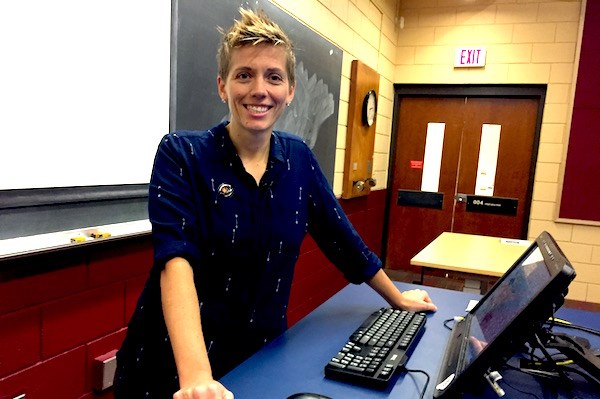"Don't Drop the Mic, USE a Mic:" A Campuswide Campaign

12/16/2019
By Karen Angelo
Music education major Rachel Janielis says it’s stressful when she cannot properly hear a professor speaking or a presenter talking at events.
“I remember an event at the beginning of the year when one of the people talking decided not to use a microphone,” she says. “The presenter asked if everyone could hear her and the majority of people said yes, but I could not. It was frustrating, because I missed the information.”
Using a microphone ensures that everyone in a room has access to the information being presented, says Asst. Director of College Based Advising Jen Keene-Crouse. She has organized a campus campaign to encourage public speakers to always use a microphone.
Keene-Crouse has rounded up support from College Based Advising, Disability Services, Hospitality & Event Services and the Zuckerberg College of Health Sciences to promote the “Don’t Drop the Mic, USE a Mic” campaign. The initiative encourages presenters to use microphones at large meetings, events and conferences and in classrooms.
“This issue is important to me because I have people in my life, personally and professionally, who have voiced their frustrations about not being able to fully access what’s being said at a meeting or event,” Keene-Crouse says. “In some cases, this is due to being hard of hearing, but in other cases, it’s simply because the speaker cannot be heard by anyone – with or without hearing loss.”
Most people don’t like to hear the sound of their own voices coming across a microphone, but everyone wants their message heard – and that requires amplification.
Nicole Champagne, associate dean of the Zuckerberg College of Health Sciences, has seen an uptick in student evaluations that mention the difficulty of hearing presenters and instructors clearly.

For those with hearing loss, Disability Services provides technologies such as receivers that amplify speech, as well as other services such as note-takers.
Assoc. Director of Disability Services Brandon Drake agrees that presenters should make a habit of using a microphone.
“There’s the obvious situation of having someone who may be hard of hearing in the room, but there are a lot of other things that come up that make a speaker difficult to hear,” he says. “Instructors are competing with ambient sounds from air vents, side conversations and hallway noise. Some students may have anxiety and sit near the back door away from the instructor, and many students may be learning in English as their second language.”
Keene-Crouse created a button that says “Don’t Drop the Mic, USE the Mic” to raise awareness about the issue on campus. She suggests that speakers never ask if a group can hear them. Instead, she urges them to use the microphone so that everyone can contribute, learn and participate.
“If everyone on campus was using a microphone, it would allow me to learn as equally as my peers do and allow me to listen in class at ease,” says Janielis.
Hospitality & Event Services (HES) can provide microphones in event spaces on campus to support larger gatherings.
“If a space doesn’t have a built-in sound system, we will do our best to provide a portable system so that special events can be amplified,” says Rick Sherburne, director of HES. “We will also be posting placards on our podiums next semester to remind speakers to use microphones.”
